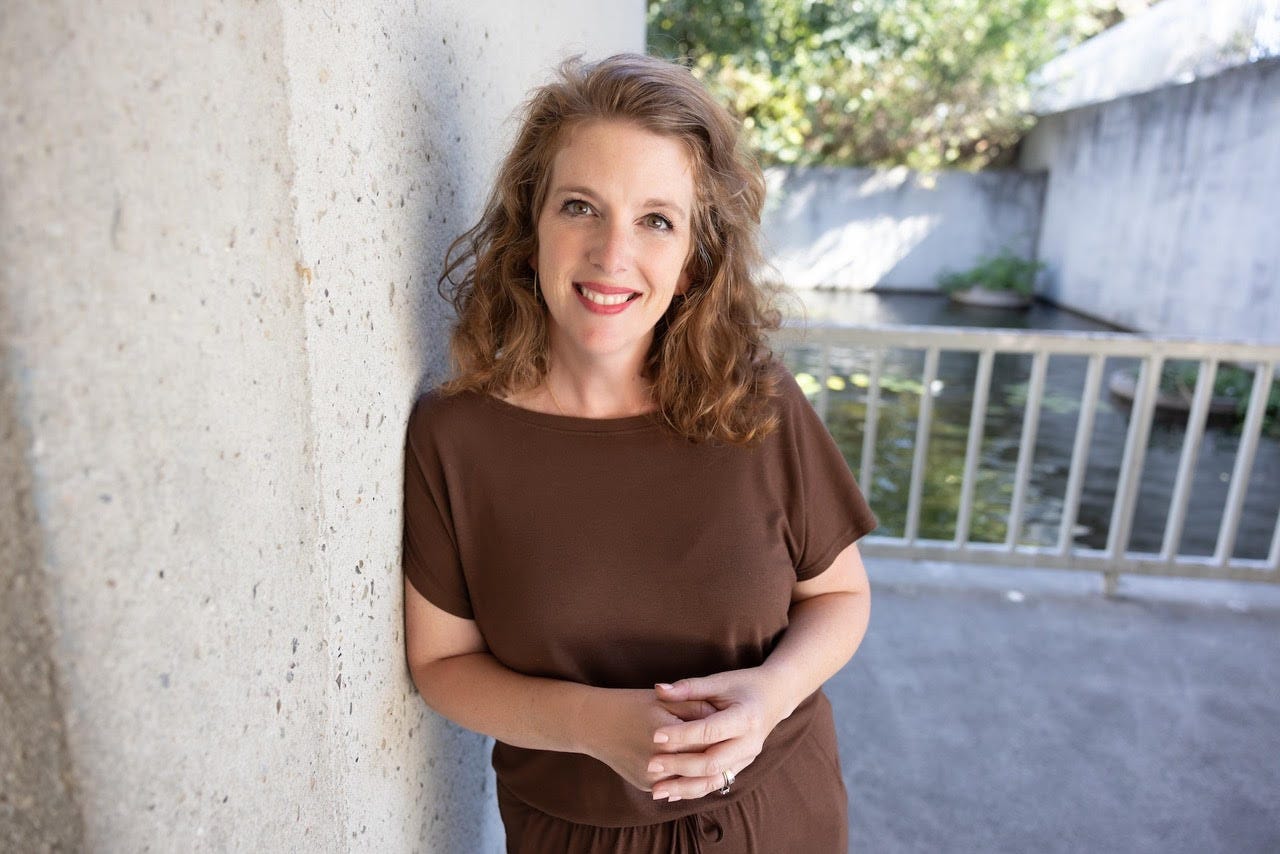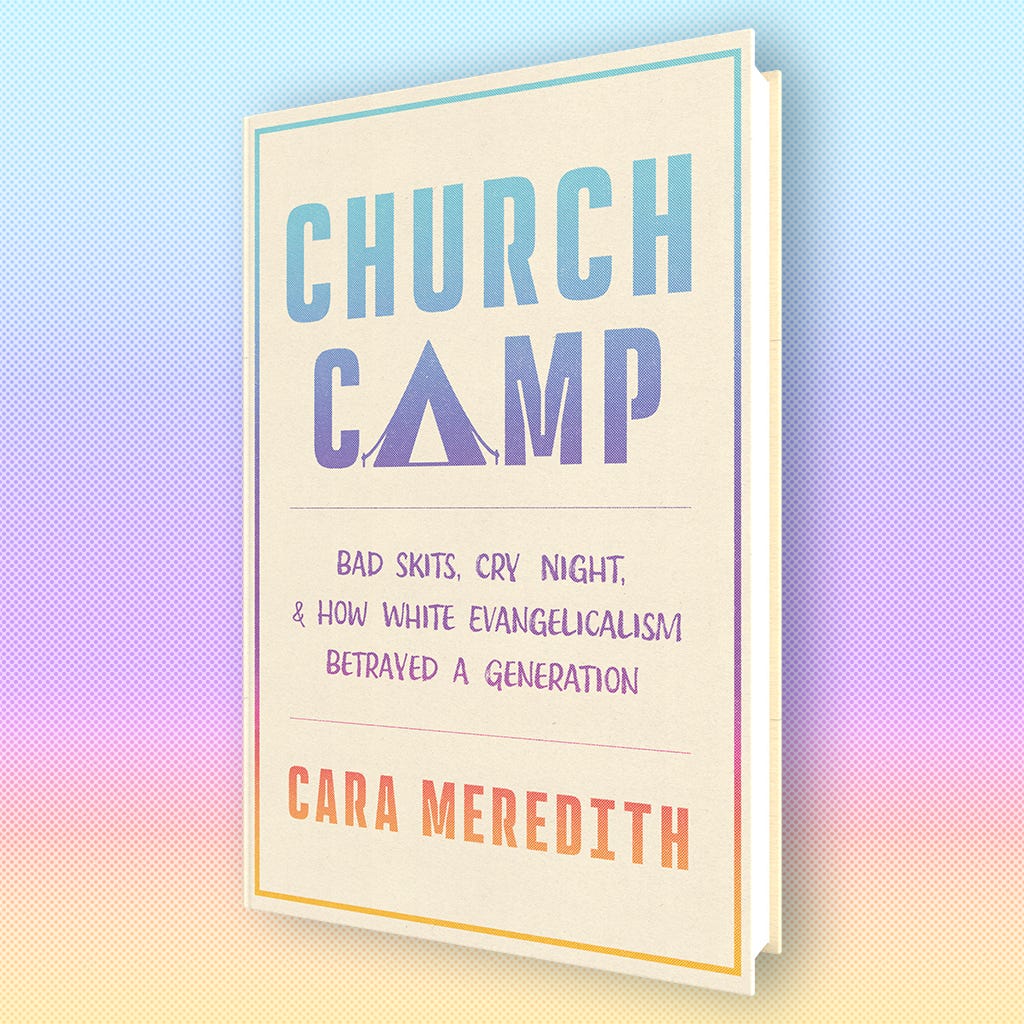Were you a camp kid? I was not. I have one memory of one week in the woods. I think I wrote my parents every day. I think I sobbed on my bunk bed every night. I’m sure I did not sleep. The sound of girls giggling or whispering or even mouth-breathing beside me? An irritant to my nervous system. I pined for cool and artificial air. At the end of that one week, I popped my parents' hope of ever getting another week to themselves. And then, when I became a parent, wished hard my kids would be hardier.
This is one of the paradoxes of camp—it can be both formative and de-formative. Add the adjective church to camp? Now, we’re talking not just archery but theology—and, if you look at the church camps with the biggest influence in America, often a white evangelical theology where God is a benevolent father, Jesus is a rascally cowboy, and evidence of the Spirit is best emoted, whether in raised hands or fat tears. It’s this kind of theology that my friend Cara Meredith is debunking and rewriting in her smart new book, Church Camp: Bad Skits, Cry Night, & How White Evangelicalism Betrayed a Generation.
What I love about Cara is how much she loves church camp. (Her bouncy red hair and bouncy personality exude cool counselor vibes.) She excavates her own experiences of going to and working at church camps, alongside interviews with former church campers who are making sense of their own belonging and dis-belonging in those spaces. Here she acknowledges another paradox of camp—in that space, she was never more alive and never more aware of the damage done in Jesus’ name. And yet her story never turns bitter. She calls to mind Dr. King’s words: “I criticize America because I love her.” She wants better for all those hardy camp kids.
Fingers-crossed my kids are among them.
Erin Lane: What is your favorite thing about being an adult?
Cara Meredith: I think my favorite thing about being an adult, which is to also say, getting older, is not making apologies for that which needs no apologies. It means that I can give a shit, or not. It means that I can say what I mean and believe what I want to believe and be who I am deep down inside without needing to be someone I’m not.
I know this isn’t a challenge for everyone, but in the world I inhabited for a good, long portion of my life (which is to say in white evangelical church camp environments), there was a certain way of being and believing and operating that was most accepted. If you conformed, if you assimilated, if you believed and said and did all the right things, then you were accepted—then you had belonging.
But as I’ve learned from you, Erin, that’s not how belonging works. Belonging happens simply because we’re human, simply because we’re us at the end of the day.
Erin: You wrote a book called Church Camp! Tell us! What shitty script were you trying to tear up?
Cara: Perhaps in the same vein, I was trying to tear up a shitty script that refused to welcome everyone to a table of belonging. I knew that the script white evangelicalism frequently told and embraced did great harm to women, people of color, and the LGBTQ+ community in particular. What would it look like to tear that script up into a thousand tiny pieces, yes, exposing the harm, but also proving true the value and worth of those who had been marginalized at the hands of those who so often held power? What would it look like to tell a new story of those people but also of God? What would it look like to imagine new ways forward for camps, as well, so that harm is no longer a defining factor?
Erin: Okay. Now flip it. What truer, weirder story did you set out to write instead?
Cara: Well, you know this quite well since you’re the one who helped me identify it, but this book birthed out of a desire to find a singular instance or place in my life of the both/and.
After my first book came out in 2019, this thing called the global pandemic happened a year or so later—and even though I had a really hard time writing for awhile, when I started to come out of the fog of that experience, I was struck by paradox. More often than not, two opposite things tended to be true at the same time.
I finally put together a proposal and a handful of chapters that paired those opposite things together, but when my agent and I brought it to publishers, we kept hearing a similar refrain: We like the idea, but we need a through line. They needed an instance of one thing, instead of a whole bunch of disparate things, if that makes sense.
In the end, church camp was that one thing for me: It was one of the most formative places in my life, and also a place that I didn’t know if I could send my own kids to when they got old enough. As it goes, the weirder story I tried to write was one of paradox.
Erin: Writing—and Christianity—is about the threat of resurrection. What is the scariest thing about bringing this book to life?
Cara: I did not mince my words. I did not hold back. As much as I believe I held the aforementioned tension of the both/and, I also firmly stated my beliefs—beliefs that are not supposed to be questioned, let alone stated out loud to those who might disagree (which is to say, with those whose flag is still planted in white evangelical waters). As much as I make no apologies for Church Camp and am proud of the words I wrote, I also recognize that there are going to be a whole lot of people who are not happy with what I wrote. Sometimes I want to have my cake and eat it too; I want to keep relationships intact and friendships afloat, but bringing this book to life also means the loss of those who do not agree with what I’ve written. I guess I want the both/and even in this area too.
Erin: Publishing a book is a shiny milestone! What is something less shiny about a life well-lived you’re celebrating this week?
Cara: One of my neighbors just helped me put drip irrigation into my backyard garden beds, and I am over-the-moon excited about what this is going to mean for my gardening life moving forward! My hunch is that I’ve not been watering enough in the past, so I imagine the harvest is going to change considerably, just with this one tiny milestone. But, also, can we notice the fact that one of my neighbors helped me install the system? That’s generosity and warmth and welcoming right there, which calls for a celebration in and of itself.
P.S. Want to celebrate Cara for doing her work and sharing her story? If so, consider joining me in donating to The Naming Project, a camp Cara highlights in the book that serves youth of all sexual and gender identities.
P.P.S. Curious what I mean in these q&a’s by the “threat of resurrection?” With Easter this month—the day on which Christians celebrate Jesus’s resurrection—it occurred to me to reexplain—or rather let Parker Palmer do it for me. Yes, Parker Palmer is now on Substack.
P.P.P.S. Were you a camp kid? Do you send your kids to church camp? How are you exposing (and embracing) the paradoxes of it all? Tell me your tiny kazoos (a.k.a. tiny victories) in the comments below.






Thank you for generously sharing your space, sweet Erin. Appreciate you!
As always, Erin, I appreciate the humans and their voices that you lift up. Tammy and I have directed a church family camp for a number of years. Earlier this spring we were asked to write a paragraph or so naming an impact we saw as a result of the camp. Partly because it is a UCC camp, and I think also because it is an inter-generational camp, some of the paradoxes you and Cara named are a bit different. It's not perfect, nor is it for everyone. But for many, it is a lifeline. It is worth noting we live in a part of the country where youth camps of all stripes are in serious decline too. But here is what we wrote:
The Freedom to Be
One of the great gifts of family camp at Moon Beach is the multi-layered way people of all ages have the freedom to explore who they are in the world. This means children and adults exploring their faith in new ways. It means allowing children to feel the freedom to explore nature, the water and the open space of camp in a world of schedules and organized activities.
In our case, it also has meant the freedom and safety for young people and their parents to explore what it means to live as non binary or transgendered people. We have a number of teens who have transitioned over the years they have been coming to camp. They and their parents have valued the loving and welcoming faith community that emerges at camp. They come to know a sense of belonging in a new way.
Over the years the religious and cultural context has become even more dangerous, and one can not underestimate the power of a spiritual community to process all that these transitions entail. More than anything, we have witnessed the powerful transformations in young people who have felt truly seen for who they are, and who they are becoming.